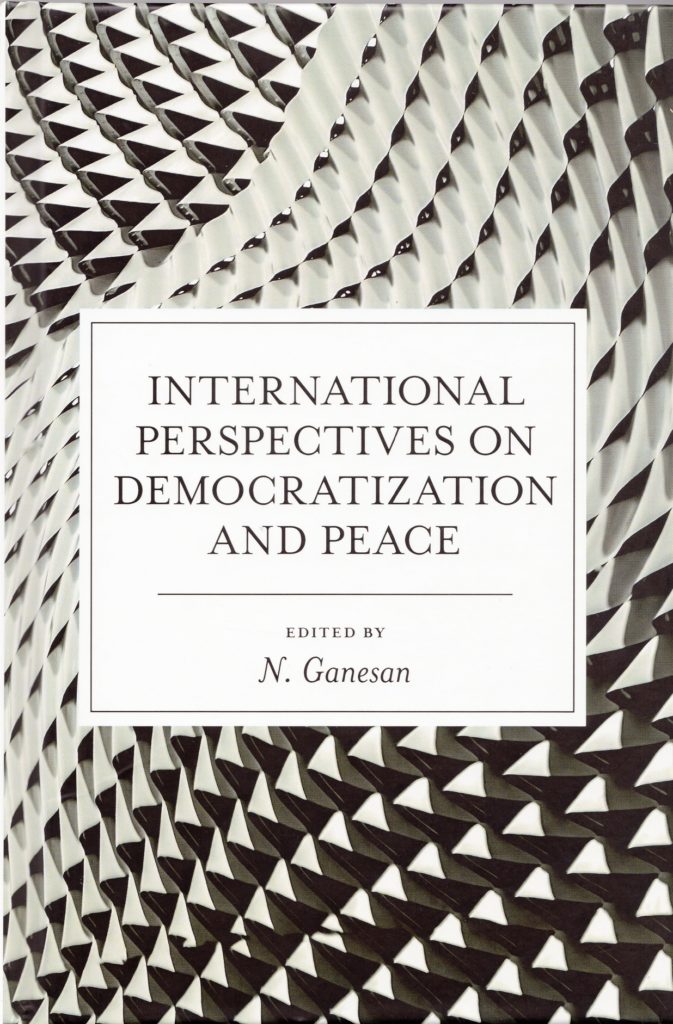Edited by Narayanan Ganesan (Bingley, WY: Emerald Publishing, 2020)

The edited volume International Perspectives on Democratization and Peace examines the important issue of how the process of democratization affects states that are in civil war or conflict. It begins with a general introductory theoretical chapter on the meanings of peace and democracy. Then it goes on to look at the impact of the democratic process on conflicts and in particular at the United Nations’ active involvement in conflict resolution in the 1990s when the Cold War had ended. This chapter is then followed by another broad based chapter that details the impact of colonization on democratic developments in the Pacific Islands.
The second part of the book is a compilation of seven case studies drawn from three different continents on the actual impact of democratization on states in civil conflict. The three case studies from Asia are Cambodia, Myanmar and Sri Lanka while the Latin American countries are Colombia and Guatemala. The last two African case studies are Angola and Mozambique. All the authors are country experts and assessed the situation in relation to a common frame of reference to make comparative work easier. Issues addressed include the history of the conflict, external involvement, phases of the conflict and how peace was eventually negotiated. Special importance is paid to how the onset of democratization aided or hindered the peace process.
The third and final part of the book starts with a chapter that broadly examines how Asia, unlike Europe, is not privy to a common set of aspirational norms and values that underpin a common and shared sense of security. Consequently, there is a trust deficit that has stymied the evolution of a common structured security community like the kind that obtains in Europe. The last chapter draws the book to a close by comparing the experiences of the seven case studies in order to arrive at some empirically grounded general observations. Such observations include how the Cold War exaggerated the civil conflicts and led to the involvement of major regional and world powers in them and how peace settlements tend to favour incumbent regimes. Hence, even with the involvement of the United Nations and its peacekeepers, civil conflicts are often not fairly resolved among the feuding parties. There also appears to be some amount of fatigue that creeps in during drawn out negotiations and settlements.
[Contents]
Introduction (N. Ganesan)
- Open Roads to Peace and Democratization (Mónica Dias)
- Post-nuclear/Post-colonial Challenges to Democratization in the Pacific (Robert Jacobs)
- Democratization, Peace and the Differences Between Asian and Western Approaches: The Case of Cambodia (Makiko Takemoto)
- Democratization and Its Impact on Ethnic Conflict and Peace in Myanmar (N. Ganesan)
- The Peace Process in Sri Lanka: The Challenges for Democracy After Decades of Civil Conflict and Terrorism (Raquel Duque)
- A Democratic Tradition as the Background to Armed Conflict: The Paradox of the Columbian Case? (Margarita Cuervo Iglesias)
- The Roads to Reinvigorate the Peace Agreements: Between Electoral and Justice Reforms in Guatemala (José Carlos Sanabria Arias)
- The Angolan Process of Peace and Democratization: A Case Study (Raul Tati)
- Peace and Conflict in Mozambique: A Long Road to Democracy? (António L. Fontes Ramos)
- Comparative Analysis of the Regional Security System of Europe and Asia: Dilemma of the Asian Security System (Gen Kikkawa)
Conclusion: Impact of Democratization on Civil Conflicts (N. Ganesan)
